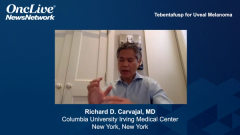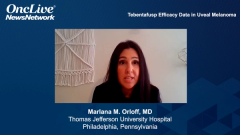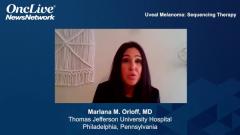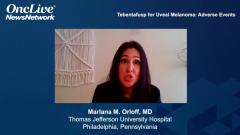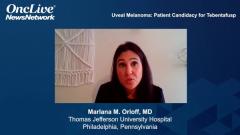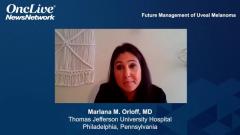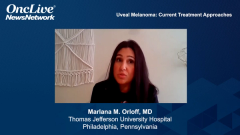
Tebentafusp for Uveal Melanoma: Cytokine Release Syndrome
Advice to help educate patients about symptoms and management of cytokine release syndrome following treatment with tebentafusp for uveal melanoma.
Episodes in this series

Richard D. Carvajal, MD: The other big category of toxicity is the cytokine release syndrome [CRS]-type symptoms. In addition to counseling patients about the skin toxicity, I always tell them that about 6 hours after the infusion, particularly the first one, you’re going to get fevers, you’re going to get some chills, and your blood pressure is going to start to drop. But it’s all going to go away by 24 hours after induction of infusion. We have looked at the peripheral cytokine changes, and we’ll see it peaks 6 to 8 hours after that infusion, so that correlates with the onset of the fevers and these symptoms. But how have you managed the hypotension in these CRS-type symptoms?
Marlana M. Orloff, MD: We put everyone on fluids when they come in, about 150 cc an hour, just understanding they may not be drinking a whole bunch while they are there, and then using things like Tylenol or other drugs for fever. Then if we start to see the blood pressure drop a little bit, we fluid challenge them, and sometimes you’re given a couple of boluses and keeping the blood pressure up. I will say that we fortunately, in all the patients we have treated in our institution have not had to use steroids or tocilizumab, which is also used at times for the significant CRS. I have not had any of the really significant ones that make you nervous. We have been able to treat most of our patients with fluids. An important thing is understanding someone’s blood pressure. It’s a bit different if someone comes in and they run a blood pressure of 100 and they drop to 90 [mm Hg] vs they normally run a blood pressure of 170 and they drop to 90 [mm Hg]. It’s knowing when to be aggressive with fluids, but it is important that if you feel like you’re not getting response from fluids, using things like steroids early.
Richard D. Carvajal, MD: That’s right. We looked at the 102 [IMCgp100-102] experience, and none of the patients required tocilizumab on that study. Steroids were used in fluid refractory patients, but certainly most patients were easily well controlled just with fluid boluses. I have adopted your strategy of starting all patients on standing fluid, and since I have done that, I haven’t had any problems at all.
Marlana M. Orloff, MD: I can’t imagine that that’s it, but maybe you just have to flood the system a little and give them a little buffer so they don’t get into that danger zone, but you can certainly see really high fever, and we’re talking like 104 °F. For some of these patients who hadn’t had a fever, they can feel really yucky, so you always worry, and you worry about both the blood pressure and also the drop in oxygen. It’s interesting the way cytokine release syndrome is defined; grade 1 CRS is just a fever. Grade 2 is when you have a little bit of blood pressure and a little bit of oxygen need, but it’s responsive to fluids. Then obviously with higher grades you need interventions with things like pressors. It’s being vigilant, exactly as you do, explaining to the patients why they are getting admitted to the hospital, what you are looking for, having a nursing staff that is on top of it, calling you if they notice any change in the vital signs, and being proactive about it.
TRANSCRIPT EDITED FOR CLARITY


